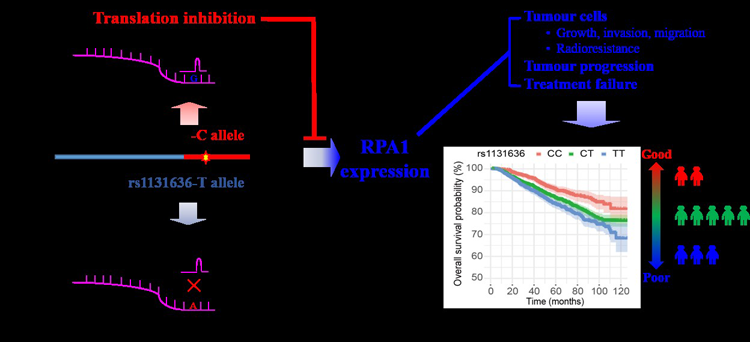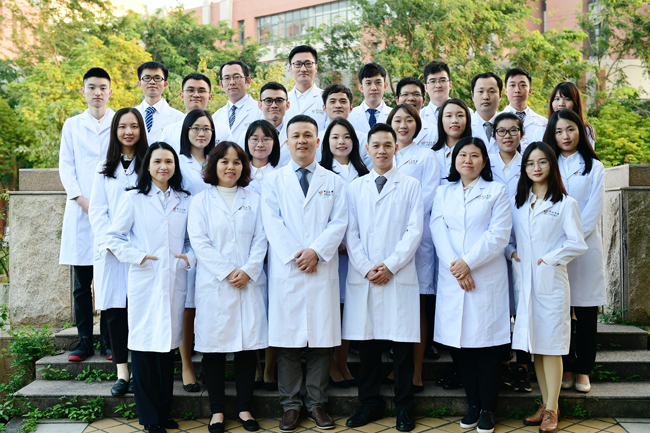Recently, Prof. Jin-Xin Bei’s group from Sun Yat-sen University Cancer Center (SYSUCC) finished the first large-scale investigation on associations between genetic variants and prognosis for nasopharyngeal carcinoma (NPC), involving multiple cohorts and up to 5,553 patients from Southern China and Singapore. The study identified a novel germline polymorphism at gene RPA1, which is significantly associated with survival outcomes in patients with NPC, and demonstrates the potential roles of RPA1 as a prognostic predictor and radiosensitizer for NPC both in vitro and in vivo.
The original work was published in Advanced Science’s online version on March 20th, entitled “Germline Polymorphisms and Length of Survival of Nasopharyngeal Carcinoma: An Exome-Wide Association Study in Multiple Cohorts”. Dr. Yun-Miao Guo from SYSUCC, Dr. Melvin Chua from National Cancer Centre Singapore (NCCS), and Dr. Yanni Zeng from Zhongshan School of Medicine contributed equally to this work, as well as two Ph.D. candidates, Jie-Rong Chen and Yan-Chun Feng from SYSUCC. Prof. Jin-Xin Bei, Prof. Yi-Xin Zeng, and Prof. Hai-Qiang Mai from SYSUCC and Prof. Jianjun Liu from Genome Institute of Singapore are the corresponding authors.
Nasopharyngeal carcinoma (NPC) is an Epstein-Barr virus related malignancy with a uniquely ethnic and geographical distribution, which is prevalent in Southern China, South-eastern Asia and Northern Africa. Survival outcomes in patients with NPC have improved substantially, largely due to the widespread implementation of intensity-modulated radiotherapy (IMRT) and the addition of platinum-based chemotherapy in patients with loco/regionally advanced disease. Nonetheless, the current treatment strategy and risk stratification for clinical outcomes remain confined to the conventional TNM classification system. Patients with the same clinical stage have different outcomes after receiving similar treatments, indicating heterogeneity among patients with the same clinical stage as categorized by the TNM system and the limitation of the system in predicting the treatment outcomes. Disease recurrence and metastasis are major causes of treatment failure and thus poor survival in patients with NPC. Therefore, it’s important to identify effective biomarkers or indicators and reveal the underlying mechanisms for precise treatment planning and accurate prognosis of patients with NPC.
The study was strengthened by its large sample size and longitudinal span. A total of 5,008 patients diagnosed at SYSUCC between 2003 and 2015, and 545 patients enrolled at NCCS from 2008 to 2018 were recruited and genotyped using an exome-wide SNP array since 2012. We conducted a two-stage association study with multiple cohorts and found that SNP rs1131636, which is located at the 3′-UTR of RPA1 on chromosome 17, was significantly associated with overall survival in patients with NPC. Patients carrying the T allele of rs1131636 tended to have inferior outcomes.

Figure 1. Association between rs1131636 genotypes and overall survival in patients with NPC
Bioinformatics and biological assays show that rs1131636 has regulatory effects on upstream RPA1. Functional studies further demonstrate that RPA1 promoted the growth, invasion, migration, and radioresistance of NPC cells. Additionally, miR-1253 has been identified as a suppressor for RPA1 expression, likely through regulation of its binding affinity to rs1131636’s locus. To the best of our knowledge, this is the first study to reveal the potential of RPA1 as a biomarker for precise prognosis, radiosensitization and a drug target for NPC patients.

Figure 2. The mechanism of how the genetic variant at RPA1 affects the prognosis of NPC
This work was supported by the National Key Research and Development Program of China (2016YFC0902001), the Sci-Tech Project Foundation of Guangzhou City (201707020039), the Guangdong Innovative and Entrepreneurial Research Team Program (2016ZT06S638), the National Science Foundation for Excellent Young Scholars (81222035), the Chang Jiang Scholars Program, the National Program for Support of Top-Notch Young Professionals, the Special Support Program of Guangdong, and Sun Yat-sen University’s Young Teacher Key Cultivation Project.

Prof. Jin-Xin Bei and his team from Sun Yat-sen University Cancer Center (SYSUCC)
Link to the paper: https://onlinelibrary.wiley.com/doi/full/10.1002/advs.201903727
Copyright:Sun Yat-sen University Cancer Center Designed by Wanhu.